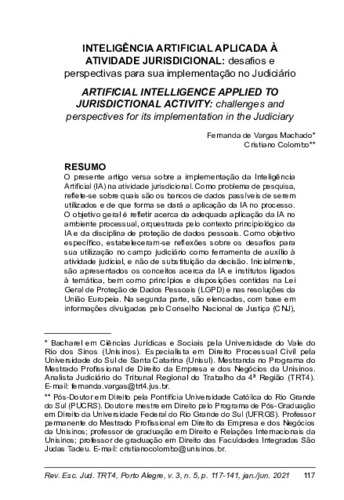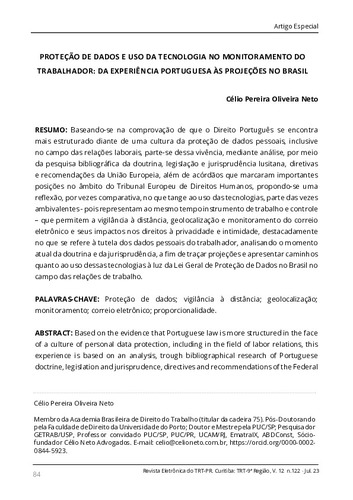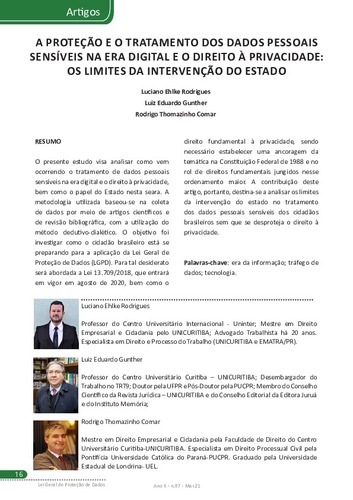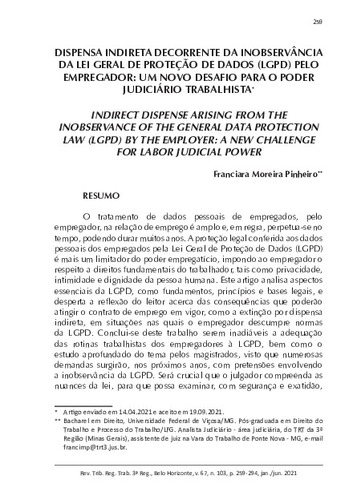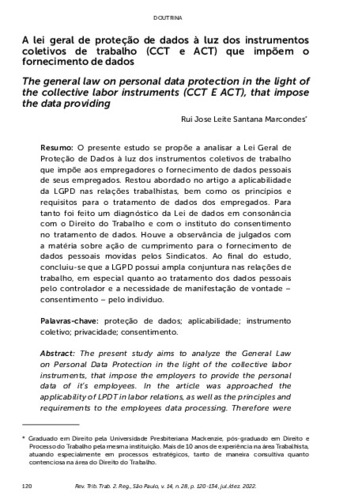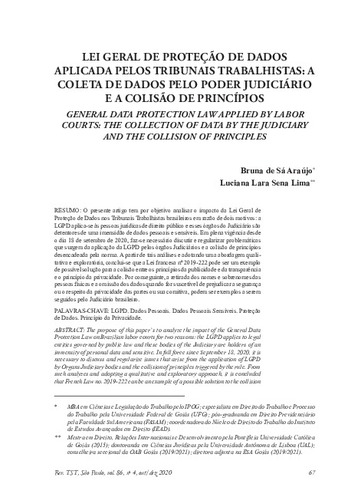Artigo de periódico
Inteligência artificial aplicada à atividade jurisdicional: desafios e perspectivas para sua implementação no Judiciário
| dc.contributor.author | Machado, Fernanda de Vargas | |
| dc.contributor.author | Colombo, Cristiano | |
| dc.date.accessioned | 2023-12-04T21:14:06Z | |
| dc.date.available | 2023-12-04T21:14:06Z | |
| dc.date.issued | 2021-06 | |
| dc.identifier.citation | MACHADO, Fernanda Vargas; COLOMBO, Cristiano. Inteligência artificial aplicada à atividade jurisdicional: desafios e perspectivas para sua implementação no Judiciário = Artificial intelligence applied to jurisdictional activity: challenges and perspectives for its implementation in the Judiciary. Revista da Escola Judicial do TRT4, Porto Alegre, v. 3, n. 5, p. 117-141, jan./jun. 2021. | pt_BR |
| dc.identifier.uri | https://hdl.handle.net/20.500.12178/225036 | |
| dc.description.abstract | [por] Versa sobre a implementação da Inteligência Artificial (IA) na atividade jurisdicional. Como problema de pesquisa, reflete-se sobre quais são os bancos de dados passíveis de serem utilizados e de que forma se dará a aplicação da IA no processo. O objetivo geral é refletir acerca da adequada aplicação da IA no ambiente processual, orquestrada pelo contexto principiológico da IA e da disciplina de proteção de dados pessoais. Como objetivo específico, estabeleceram-se reflexões sobre os desafios para sua utilização no campo judiciário como ferramenta de auxílio à atividade judicial, e não de substituição da decisão. Inicialmente, são apresentados os conceitos acerca da IA e institutos ligados à temática, bem como princípios e disposições contidas na Lei geral de proteção de dados pessoais (LGPD) e nas resoluções da União Europeia. Na segunda parte, são elencadas, com base em informações divulgadas pelo Conselho Nacional de Justiça (CNJ), ferramentas de IA em desenvolvimento ou já implementadas em tribunais do país, bem como perspectivas quanto ao uso dessa tecnologia na atividade jurisdicional. Por último, são apresentadas considerações finais, atribuindo ao ser humano a centralidade. A inteligência artificial deve ser pensada e implementada em favor da humanidade e estar sob seu controle, mediante o emprego de meios transparentes e seguros, observando os direitos fundamentais, em especial, a dignidade da pessoa humana e o bem-estar de todos. A metodologia utilizada na pesquisa é dedutiva, com revisão bibliográfica e documental, abrangendo doutrina e legislação nacional, da União Europeia e normativos do Poder Judiciário. | pt_BR |
| dc.description.abstract | [eng] This article deals with the implementation of Artificial Intelligence (AI) in the jurisdictional activity. As the subject of this research, it is reflected on which databases are likely to be used and how the application of AI will take place in the process. The general objective is to reflect on the proper application of AI in the procedural environment, orchestrated by the principled context of AI and the discipline of personal data protection. The specific objective is to establish reflections on the challenges for its use in the judicial field as a tool to aid judicial activity, and not as a substitute for it. Initially, the concepts about AI and institutes related to the theme are presented, as well as principles and provisions contained in the General Law on Personal Data Protection (LGPD) and in the resolutions of the European Union. In the second part, AI tools under development or already implemented in courts in the country, as well as perspectives on the use of this technology in the jurisdictional activity, are listed based on information released by the National Council of Justice (CNJ). Lastly, final considerations are presented, centralizing on the human being . Artificial intelligence must be thought and implemented in favor of humanity by being under their control, through the use of transparent and secure means, observing fundamental rights, in particular, the dignity of the human person and the well-being of all. The methodology used in the research is deductive with bibliographic and documentary revision, covering national and European Union doctrine and legislation, as well as norms of the Judiciary. | pt_BR |
| dc.description.tableofcontents | Inteligência artificial (IA): Inteligência artificial (IA) e banco de dados do poder público. Quadro jurídico nacional e europeu -- Inteligência artificial na atividade jurisdicional: Perspectivas ao uso da inteligência artificial na atividade jurisdicional | pt_BR |
| dc.language.iso | pt_BR | pt_BR |
| dc.relation | Brasil. Lei geral de proteção de dados (LGPD) (2018) | pt_BR |
| dc.relation.ispartof | Revista da Escola Judicial do TRT4: vol. 3, n. 5 (jan./jun. 2021) | pt_BR |
| dc.relation.uri | https://www.lexml.gov.br/urn/urn:lex:br:federal:lei:2018-08-14;13709 | pt_BR |
| dc.subject | Brasil. Lei geral de proteção de dados (LGPD) (2018) | pt_BR |
| dc.subject | Função jurisdicional, inovação tecnológica, Brasil | pt_BR |
| dc.subject | Inteligência artificial, aspectos jurídicos | pt_BR |
| dc.subject | Poder judiciário, inovação tecnológica, Brasil | pt_BR |
| dc.subject | Dados pessoais, proteção, Brasil | pt_BR |
| dc.title | Inteligência artificial aplicada à atividade jurisdicional: desafios e perspectivas para sua implementação no Judiciário | pt_BR |
| dc.title.alternative | Artificial intelligence applied to jurisdictional activity: challenges and perspectives for its implementation in the Judiciary | pt_BR |
| dc.type.genre | Artigo de periódico | pt_BR |
| dc.identifier.rvbisys | 001223499 | |
| dc.relation.ispartoflink | https://hdl.handle.net/20.500.12178/224664 | pt_BR |
Ce document figure dans la(les) collection(s) suivante(s)
-
Artigos9497


